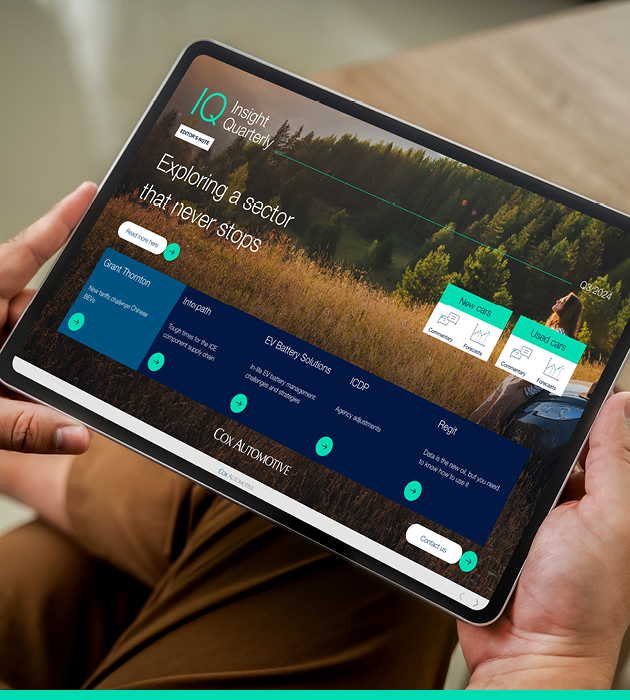Helping you stay informed about the industry’s most important trends & topics.
Discover Insight Quarterly.
Philip Nothard, customer insight and strategy director at Cox Automotive UK, explores how dealers are changing their stock profiles and why accurate market data and insight is needed now more than ever.
The moment all dealers have been waiting for has finally come.
On June 1st, car dealerships across the country opened their doors and welcomed customers into their showrooms for the first time in over two months – providing they can meet the COVID-19 secure guidelines to keep workers and shoppers safe.
With most dealers unable to do any meaningful business since lockdown, this is undoubtedly a significant occasion and one that most in our industry will welcome.
Whilst we don’t know what the immediate or long-term future looks like, it is a safe bet that social distancing will be with us for some time. As a result, dealers will be emerging into an unrecognisable market with many new challenges to overcome if they want to succeed.
The simple fact is no one working today has prior knowledge on how to be successful during a pandemic. To make the most of a volatile and unpredictable post-lockdown market, dealers will need the support of data and insight to back up their gut instinct.
To better understand the challenges dealers will face, I recently put out a survey to over 200 key industry professionals. Nearly a half of respondents have said they will review their stock profile as a result of the impact of COVID-19, with a majority expecting to invest more in used stock.
The biggest likely cause for this shift is changing buyer behaviours. One way or another, lockdown has affected everyone. But as the economy picks up and the government encourages people to go back to work, countless people who rely on public transport will be left in a tricky situation – do they potentially risk their health and safety in an enclosed space such as a bus, or do they resort to personal transport? Of course, some will walk or bike, but for the majority, this won’t be an option.
A recent Auto Trader survey sheds some light. Over half (56%) of UK driving licence holders surveyed (1,059) who currently don’t own a vehicle said COVID-19 has made them consider purchasing a car when it’s safe to do so.
Optimists will hope that this will lead to high consumer demand once showroom doors open, and we could see a quick return ‘normal’.
But there are also economic pressures to consider. Many households have experienced, or are fearing, a drop in income and will be unwilling to part with a lot of money on a new or nearly new car. So, it’s understandable that consumers will be cautious about how they spend their money and as a result we’ll likely see increased demand for older and cheaper used cars.
To ensure the market can have a strong rest of the year, it’s vital that dealers meet this demand and review their stock profiles accordingly.
"Nearly a half of respondents have said they will review their stock profile as a result of the impact of COVID-19, with a majority expecting to invest more in used stock."
My survey shows that dealers agree with this sentiment. Three-quarters expect more car purchases as an alternative to public transport, with 40% expecting a preference for used over new. In addition, 42% expect to see a cautious attitude towards financing in the long-term.
Dealers need to source stock cars for their forecourts to meet this demand for cheaper cars but adjusting their stock profile doesn’t come without some risk. Wholesale prices are likely to be unpredictable for the foreseeable and dealers won’t want to overpay for a vehicle and risk losing crucial margin.
A remarketing platform like Dealer Auction makes things easier. By providing live market data and insight into the local market, Dealer Auction allows dealers to make smart stocking decisions during the crucial post-lockdown period. It enables a dealer to quickly understand what’s selling in their area and react accordingly.
The beauty of live data is that it provides dealers with an accurate temperature check of the market at any time. Dealers will need to apply their own knowledge and instinct as always but having that data to validate their purchase is invaluable.
Of course, auctions and online remarketing channels aren’t the only place dealers source stock. Many will find that their stock mix is driven by the part-ex cars they receive. In the past where an older part-ex might have been disposed of, now some dealers will be looking to refurb and retail themselves. Data and insight are crucial to determine when this is a profitable exercise.
Although we’re all entering a period of uncertainty, dealers today are fortunate to operate in a time when there is a treasure trove of market data available to them. Buyer behaviours and the usage of cars will undoubtedly change in the short-term, if not forever. Dealers should listen to the market and react by harnessing the data and insight at their disposal to validate their own knowledge and ultimately succeed in an unpredictable market.
Start your journey
We’re transforming the operations of the world’s leading automotive brands. Get in touch to find out how.




